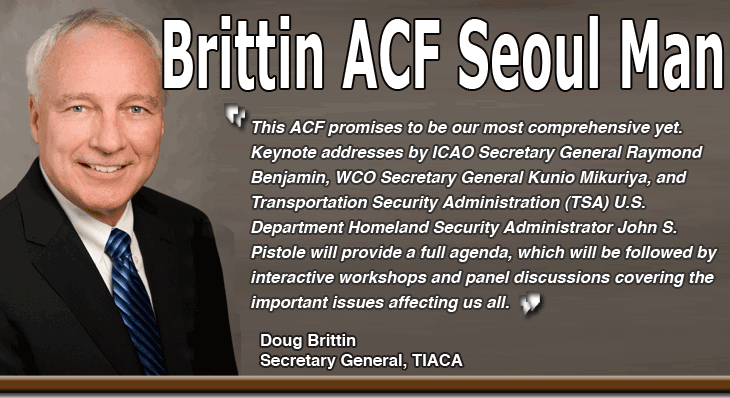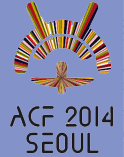Brittin ACF Seoul
Man
Flying Typers caught up with TIACA
Secretary General Doug Brittin as the 27th International Air Cargo Forum
and Exhibition takes off this week in Seoul, South Korea, October 7-9.
Mr. Britton was bullish about air markets and regarding delegates’
experiences at ACF 2014.
FlyingTypers: How
would you describe air cargo markets this year—are you optimistic
that recent signs of recovery are here to stay?
Brittin: The
International Monetary Fund forecasts global GDP growth of 3.6 percent
in 2014—up from 2.9 percent in 2013—so the signs so far are
positive. Let’s hope that a good part of this also translates into
steady growth in our industry.
FlyingTypers: It
has been quite a long downturn for air freight, irrespective of the more
general economic growth stats. Do you think the industry can emerge stronger
and/or more efficient from this painful period?
Brittin: An
economic downturn often acts as a great catalyst for businesses. They
have to become faster and sharper at finding efficiencies; they have to
look for new solutions to maintain their share of a declining market;
and they have to stay very close to their customers. More often than not,
they emerge from this period stronger and more innovative than before.
That’s exactly what I expect to see happen to the air cargo industry
as we work together for a brighter future.
FlyingTypers: How
are supply chain planning strategies—such as near-shoring, new technological
trends such as the ‘miniaturization’ of cargo, and the use
of Cloud IT systems and 3D Technology—affecting your long-term view
of air freight demand on the key lanes to Europe, and U.S. from Asia?
Brittin: Modal
shift as well as miniaturization and on- and near-shoring are all issues
for our industry, but trends come in cycles and also move on. The push
before smartphones appeared was for increasingly small devices. Now the
latest iPhone is bigger than the model before. The speed of product development
means that there are peak demands as soon as a new piece of technology
is launched.
3D printing is here already, but most people
don’t see it as a threat yet. It may change the demand for air cargo
in the long term, but it will take time. What is important is that we
work together as an industry to deliver an efficient service and reduced
transit times. Collaboration has never been more important and the ACF
is a strong platform for us to develop new ways to work together.
FlyingTypers: Why
was Seoul in South Korea chosen to host ACF 2014?
Brittin: TIACA
events take place all over the world, reflecting the global nature of
the organization. Boeing’s Air Cargo
Forecast shows Asia has the largest share of the market in total freight
traffic and will continue to lead industry growth through to 2034. Our
hosts, Seoul’s Incheon Airport, are the world’s fifth largest
by cargo volume and they are planning some interesting expansion as well
as pioneering e-freight ideas.
FlyingTypers: What
is the process TIACA employs to make the final decision on location?
Brittin: The
ACF site selection process starts four years out from a show, with a delegation
of the Board evaluating offers from airports or airlines proposing to
host. These are evaluated according to a fixed set of criteria such as
reachability, available exhibition and conference facilities, hotels etc.
After pre-selection, the committee visits
the potential host country and the facilities are inspected on site using
the same criteria. The host and local industry’s commitment to support
the forum is important. Once a cost picture is established, the Events
Committee makes a recommendation to the entire Board, who take the final
decision.
The process starts four years out to ensure
we have a good selection when booking the space. For this ACF, the site
visit took place in October 2009 and the decision was taken early in 2010.
Seoul offered a comprehensive package including
strong support from major Korean Shippers, whose CEOs were all present
and met with the selection committee. Incheon set up a committee in collaboration
with the government, the Korea International Trade Association (KITA),
the Korean International Freight Forwarders Association (KIFFA), and the
Korea Integrated Logistics Association to prepare for ACF.
 FlyingTypers:
What are some of the highlights of ACF 2014? FlyingTypers:
What are some of the highlights of ACF 2014?
Brittin: This
ACF promises to be our most comprehensive yet. Keynote addresses by ICAO
Secretary General Raymond Benjamin, WCO Secretary General Kunio Mikuriya,
and Transportation Security Administration (TSA) US Department Homeland
Security Administrator John S. Pistole will provide a full agenda, which
will be followed by interactive workshops and panel discussions covering
the important issues affecting us all. It is a unique opportunity to hear
and learn from industry leaders as well as legislators from across the
globe.
We are also privileged to have fantastic
support from our colleagues in Korea who will bring their insight into
the Asian market and we will hear from Suh Seoung-Hwan, the Korean Minister
of Land Infrastructure and Transport.
FlyingTypers: What
else is happening at ACF 2014?
Brittin: TIACA
is committed to finding, nurturing, and developing the next generation
of industry leaders and we know it is key for our members to identify
and recruit talent. The ACF will jointly host the Future Air Cargo Executive
Summit (FACES) with IATA, which was developed to provide aspiring air
cargo leaders with the opportunity to grow professionally and give industry
leaders the chance to foster the leadership needed to succeed in the 21st
century and beyond. The scheme sits perfectly with TIACA’s Professional
Development Workshop initiative launched this year. It’s another
exciting reason to visit ACF.
FlyingTypers: Are
you expecting any major decision or announcements at the show that will
affect air cargo stakeholders?
Brittin: We
expect visitors will seize the opportunity to network and find new business
opportunities—networking is a cornerstone of our TIACA mission.
There will also be addresses by key regulators on real time issues. The
workshops are deliberatively interactive, involving industry leaders and
regulators so that we can tangibly move the debate on. TIACA will also
be hosting a press conference.
FlyingTypers: Can
you give any insight into how many people are attending or exhibiting,
and how this compares to the 26th ACF? For example, are you expecting
a lot of walk-in visitors?
Brittin: Moving
the ACF around the globe means that each event is unique and benefits
from a strong representation of visitors from the host community. We are
looking forward to welcoming thousands of our colleagues at the show next
month—just as we did in Atlanta—including many from the Korean
shipper community. And we have over 150 exhibitors attending to make the
most of this opportunity.
SkyKing |





